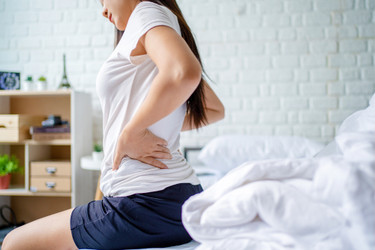Back Pain During Your Period
Posted by Wombilee on Nov 11th 2022

You wake up one morning, ready to start a day, when suddenly you feel a wave of excruciating pain through your back and abdominal area. You look at the calendar and realize that your period is about to knock on your vaginal doors. It certainly is not fun.
A period can cause a woman to feel pain in her uterus, back, thighs, legs, and sometimes in her entire body. The bleeding from the vaginal canal is not the only thing a female body has to suffer. It brings a series of different symptoms that make a period even more difficult to bear.
What is a period?
A period, also known as menstruation, is a biological phenomenon in which a female bleeds out of her cervix and vagina for about 3-8 days every month. Menstruation begins at puberty and ends with menopause. During a typical period, a woman's body gets rid of the uterine wall, nutrients, and some blood, which flows down her vagina.
What does a period cramp feel like?
Usually, a period cramp is different from a stomach cramp. It can be as dull as a bit of baby punching in the uterus or as intense as a full-blown adult kick. Usually, when a female is on her period, she might feel constant discomfort and pain in her uterus and back, especially in the first few days of the period. Some women also feel pain in their pelvic region during menstruation.
Why causes pain during menstruation?
Pain in the lower back, lower abdomen, and pelvic area during menstruation is considered normal. This pain is related to contractions and relaxations in the uterus walls. A hormone called Prostaglandins is responsible for uterine cramps. These hormones are released in the uterus during the period to regulate contractions to shed the uterine lining. These hormones are also responsible for ligament loosening, which can cause spinal instability and period pain. An excess release of prostaglandin hormone can cause painful menstruation, medically termed Dysmenorrhea. Prostaglandins can also cause diarrhea, headache, nausea, and fever.
Is menstrual pain normal?
The prostaglandin hormone causes contractions during a menstrual period. It starts before a woman's period dates and can last from a few days to a week. Because it is common among females, period cramps or back pain during the period is regarded as standard. However, it can be a sign that something is not correct.
Severe or longer duration of menstrual pain can be a sign of any of the following:
• Infections or tumors
• Early pregnancy
• Iron-deficiency
• Weakness
• Endometriosis
• Fibroids
Book an appointment with a gynecologist if the pain feels like a symptom or if it gets too uncomfortable. You also should consult a doctor if the pain remains constant throughout the menstrual cycle and not just during a period.
How can I cope with menstrual pain?
Period pain can be severe for some women and could be non-significant for others. However, nobody should feel dreadful every month for a few days because of period pain. There are many home remedies as well as medical treatments that one can follow to ease up the pain.
Home Remedies
Following remedies, if appropriately adapted, helps with back pain and period cramps:
• Light stretches, yoga, or other exercises.
• Heat pads, warm-water bottles, or hot showers.
• Avoiding caffeine or any other neuro-stimulant.
• Taking a nap in a comfortable position.
Medical Treatment
• Birth control pills that contain estrogen and progestin help with period pain.
• Anti-inflammatory medicine like ibuprofen and aspirin can be ingested to feel better.
However, if the pain is severe, consult a doctor. If there's an underlying pain condition, it must be diagnosed and cured first.
Conclusion
Contractions and hormonal imbalance cause period pain. It is a common problem, but it should be "manageable." It can be discomforting at first, but if the pain is constant, unbearable, or resistant to painkillers, pick up your bag and get to a doctor or the ER. Remember, humans are different, and so is everyone's period, but it should never feel like a curse.

